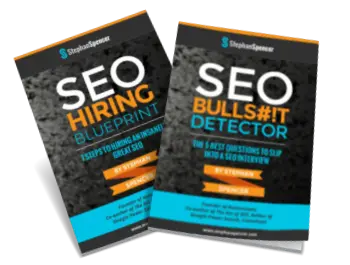The SEO All Stars Keynote at Affiliate Summit East 2016
Host: This panel is part of a larger session that happened before the Ask Me Anything session. It actually ranked really high in audience participation and audience feedback. We also had to bring it back as a keynote speaker at the Affiliate Summit East. Before I introduce the panelists and our experts, start thinking about what SEO questions you may want to ask them because this is going to become an engaging conversation and an open forum for you to be able to ask these experts anything you’d like in search engine optimization.
Let me start with Bruce Clay all the way over here to your right. Bruce Clay is the founder and president of Bruce Clay Inc., a global internet marketing optimization firm as an industry thought leader. He’s an accomplished speaker, author, and educator. He hosts a weekly podcast called SEM Synergy, and his book Search Engine Optimization: All in One for Dummies is now in its third edition.
Next up is Duane Forrester. He is the vice president of organic search operations at Bruce Clay. Prior to this role, Dwayne was a senior product manager with Bing’s webmaster program and the in-house SEM running the SEO program for MSN in the U.S. and all the Americas in his earlier Microsoft career.
He’s also the author of two books, How to Make Money with Your Blog and Turn Clicks into Customers. He’s written for publications ranging from Search Engine Land and Entrepreneur Magazine to the New York Times and Inc. He’s even advised the staff who maintained the White House’s website. That’s pretty cool.
DF: Yeah. Whitehouse.gov.
Host: Whitehouse.gov.
SSIs there a difference?
Host: I didn’t even know they had a website. All right. Last but not least is Stephan Spencer. He is an internationally recognized SEO expert and best-selling author of Google Power Search, co-author of Social e-Commerce, and co-author of The Art of SEO, which is now in its third edition and considered the Bible of SEO.
Stephan’s clients he’s consulted for include Zappos, Sony Store, Quicksilver, Best Buy Canada, Bed Bath Beyond, and Chanel. Stephan speaks at many internet marketing events, like this one. He’s contributed to the Huffington Post, Search Engine Land, and DM News, among others. He also hosts two podcasts, Get Yourself Optimized and Marketing Speak.
Again, please, let’s have your undivided attention. Put those phones away unless you’re tweeting. #ASE16. And Bruce, do you want to start us off?
BC: Sure. Good morning. I’m glad you’re all here. How many are awake? Show of hands. We’re awake. Okay, it’s a good start.
As mentioned, we’ve done this a number of times. We have a couple of interesting things that come out of this. We can start it with a question of our own. We get plenty of questions all the time. We have given this panel a number of times. The specific rule we have on questions is that when you ask a question, we ask that it be general questions for the audience.
If you have a specific question, come up and see us at the end of the session because we’re still going to be here for about an hour after the session answering questions. It always works that way. I have a couple of comments, just so you all know. We are all white-hat people. We do not cheat the system, and we will never advise you to. Google has penalties for that. The comments that we make during a session have historically been tweeted a lot.
Remember #ASC16; we encourage you to do that. Everybody should have received an evaluation form when you came in. You can save time; just circle 10. It saves a lot of time later; that way, when you leave, you can just pass it out. It won’t be a problem. I want to encourage you to do that because it really helps. I don’t know who it helps, but it really helps. We promise not to.
SS: Was that white hat, though?
BC: Yeah, it was white hat.
DF: It totally was because we’ve marked that with an ad. Right. We promise not to suck as well.
BC: Okay. We have a couple of comments about ourselves so that you can understand where we’re at. We’re going to sort of introduce ourselves, and I’ll start us with a question. We have two people in the audience with wireless mics. One, two. What will happen is I’ll probably go from side to side. When you have a question, you know, raise your hand. I point to you stand up. That way, the guy with the mic knows who you are.
Then we’ll come over and take the questions, and we’ll just go through as many as we can. Obviously, there are a lot more people here than we have time for if everybody has a question. Bruce Clay Inc. was started in January 1996. For those of you who remember, it was three years before Google. That’s when Al Gore invented the internet. It was quite a while back.
DF: Is anyone here born after that date? Oh, thank you. We’re good. What happens is that we only have to answer questions with emojis. And that makes it a whole lot harder for us.
BC: Yes. We’ve been in the ink 5,009 times, and we have done well. We’re on five continents. We cover international as well as domestic.
DF: I’m not going to walk you guys through my background. I have a background, however, in gambling. That’s kind of where I got my online start prior to that.
It was at Caesar’s Palace, legitimate gambling. I think one of the biggest takeaways from this is why this is popular with us. A number of years ago, when I was at Bing inside Microsoft, I ran a roadshow tour with Inc Magazine as our partner. We went from city to city around the U.S., and we invited small businesses to come in and ask us their pressing questions.
Bruce and I were part of that panel, as were a couple of other folks. It was a hugely successful event, and it gave us an amazing amount of exposure to small businesses, their concerns, and the problems that they faced. We managed to help a lot of folks overcome those, get past that initial hurdle, and move forward.
I think the really cool thing about it was that, you know, we talk about this as SEO and Sean—God bless him—is an awesome guy. You know, he calls this SEO. What you will probably notice throughout this is that we can field pretty much any question. We’ve got it covered in terms of topics.
If you have something beyond SEO, feel free to give it a try. A lot of times, you’ll have us just saying, you know, you need to consult a lawyer for that. There are times when you actually need legal advice on things, and we’ll point you in the right direction. Other times, though, we may just huddle behind the table here. We’re just agreeing on an answer. We’re not cowering in fear.
SS: Speak for yourself.
DF: Oh, sorry.
SS: I’ve been in this space for even longer than Bruce. I started NetConcepts in 1995 and built my first website in 1994.
DF: I started in 1972. Well, as a person.
SS: So I predate Al Gore. Yeah. My big claim to fame, though, is this book. I have a couple of others, but this is a pretty good book.
It’s a thousand pages, and I brought a few with me to hand out. Who wants a book? Who really wants a book? Like enough to come get a book. Seriously, who wants to come get a book? Seriously? You’re going to walk. Okay. There you go. Yeah, that’s it. Somebody has got to get it. The early bird gets the worm.
DF: Too long. Didn’t read.
SS: That was a joke. Okay. Anyhow, I’ve got some more to give out. If you have a really great tweet, you might get a book. If you have a really great question, you might get a book. Give me 50 bucks. You might get a book.
BC: What we’re going to do is basically start with one of our questions. Now, I’ll start with a comment. If you think you are able to learn SEO in a couple of hours, you’re probably wrong. There are two levels of SEO: things that you do and things that you actually plan for and work at. And just like affiliate, you have to work at it, you have to learn it, you have to practice it, you have to evolve it.
You have to get better over time. All of those things we are able to help you with. As I said, if you have a specific question, we’ll help you with it. Just come up at the end of the presentation. The question I’m going to start with is, what do you think is happening in search over the next six months to a year, and how does it affect this audience?
DF: That’s an interesting one. When I was at Microsoft, I spent a lot of time in the engineering groups of Bing and got to know the teams and the projects, and it was always exciting stuff. I will preface this by saying that I am still under NDA from the company. Obviously, there are some things I won’t share with you, but I will say this: the areas of voice search and gesture search are currently one of the leading areas that everyone is investing in for various and very real reasons.
If anyone here is using WhatsApp or anything like that, raise your hands and keep them up for me. Okay, maybe a quarter of the crowd. You know, it’s really fascinating. A lot of folks have a kind of love-hate relationship with WhatsApp. They don’t fully understand it or see a value for it, and so on.
However, the fact of the matter is that these messaging services are probably going to be one of the richest grounds moving forward. It’s something that everyone wants to do: communicate. Raise your hand if you have this in your life: largely virtual relationships with people. Email, Twitter, Facebook, all of that.
The rest of you are just lazy, or your arm is hung over from last night. That’s fine. Everybody has this in their lives and these services. This is why you see Google, Microsoft, and Facebook investing in artificial intelligence in these services. It might sound, might not seem intuitive at first, but those services are areas where we need to understand the emotional content and the emotional context.
To better surface information that’s relevant to the conversation and anything to do with voice and, by extension, because the voice is tied to a mobile device. Now, we get into gestures. These types of activities are going to have a big influence on search. You know, at first, over the next 6-12 months, you’ll see them. The voice stuff is already here.
SS: Can you define gestures, though?
DF: I can. In the most nascent of cases, you will be using your hands to simply execute on your device as you can now. The camera is there. You may think it’s not watching, but it is actually watching. You may think your microphone is turned off, but it’s actually listening.
Does anyone have an Amazon Echo? Right? It’s a pretty cool piece of technology. Here’s what’s really cool about it. It’s always on unless you physically unplug it. It’s always on and listening. There are plenty of instances where people have used Echo, had it turned on, just sitting on the kitchen counter, had a conversation with their spouse later that night, been surfing online and ads related to what they were talking about in their conversation now start showing up in their internet session.
And people think of that as, “Oh, that’s coincidental.” There’s nothing coincidental about it at all. That information is being gathered, shared anonymously, and then fed into systems that will then track you. And the idea is if you were interested in it three hours ago, you may still be interested in it right now.
Gesture now becomes another layer to this. I had a connection on my Xbox, and that thing was awesome because I could walk into the room and make a series of hand gestures. To get it to turn on, power up the search, and then I could tell it to order a pizza, and it would dial out over VoIP, connect me with my local pizzeria, and I could speak to the person out loud while I was letting my dogs outside, and by the time the dogs came back inside, the pizza was on its way to my house.
All of our technologies, all of this exist right now, and as mobile is already entrenched and continues to become a bigger slice of the pie, one of the biggest telling factors is that now, more than ever, people are keeping their devices for a longer period of time. The average swap time for a smartphone in the United States right now is a little over two years, provided, of course, you don’t crush it.
It’s been a little over two years since people swapped their phones, which means they’re getting deeper into the technology. They have more exposure to it. They’re managing settings at a deeper level. As that generation of millennials and the beginnings of Gen Z come into purchasing power and they start impacting these areas, it guides search. That’s where WhatsApp and all of these messaging areas and the AI behind it start to play a role. That’s, that’s my guess. That’s my take on it.
SS: All right. For me, I’d say RankBrain and machine learning are going to be either your biggest friend or your biggest enemy. A year, like last year, when RankBrain was announced, it was announced that it was running across 15% of all searches on Google.
Now, they have announced this year that it’s 100%. And I predicted back last year that it was going to ratchet up to a hundred percent very quickly. I knew it was coming. Google says there are three main things they pay attention to in the rankings, and they’ve three things they base rankings on relevance, links, and rank brain. Thanks for that.
DF: I got your back, man.
SS: Yeah, but who’s the lady on? What was it? Wheel of Fortune.
DF: Vanna White
SS: Vanna White. Thank you.
DF: There you go.
SS: RankBrain is going to be really important for you to understand and support because AI will essentially determine whether you’re creating quality content, whether it’s relevant and whether it is authoritative, instead of just link building, which still is the primary signal.
I mean, if you’re not actively link building, you’re just leaving it to chance, and that’s not a good strategy, but not the kind of low-quality link building that oftentimes you get sold when you get a phone call, right? One of these robo-dialers. No, this has to be essentially content marketing, creating really high-quality content that deserves to be shared, linked to, blogged about, and then you promote it in a way that is not spammy.
RankBrain and AI will determine whether you’re creating quality content that stands the test of time.
Having relationships with power users, and influencers, and helping them give before you get, before you’re getting, so give, then get, not go out and outreach to all these influencers and say, “Hey, I’ve got this great piece of content. Can you link to it?” That’s a get, not a give. That’s one thing is: rank brain and create stuff that is going to stand the test of time that will pass the sniff test by an algorithm that you will not be able to reverse engineer.
And neither can even the Google engineers who’ve created it. And the other thing that I want you to bear in mind is the advent of personal Sims, which we’re already seeing, you know, kind of this idea that your Sim is going to know more about you than your spouse or your significant other. It’s kind of scary, but it’s well on its way.
Think about this: You’re already subjected to this filter effect. We only get the news and buzzworthy content on social media. We know that the algorithms are going to appeal to us. We’re in a filter bubble, and it’s only going to get worse as these personal Sims take over more and more of our lives.
And that’s going to increase exponentially. Over the next year, we’re going to see that really ratchet up. But over the next few years, we are going to be so reliant on our personal SIM. Imagine somebody taking your phone away from you for a day or, you know, heaven forbid a week. Imagine being without your personal SIM, which is going to be 10X worse than that.
It’s just going to be your life, and you’re going to rely on it for everything, from letting you know if there’s a really important email in your inbox that you need to deal with immediately to giving you a heads-up on current events or booking your travel. Anything that you would imagine that you’d give nowadays to your virtual assistant, you can give to your personal Sim in the next few years.
BC: I think that it would make sense to take this as to what does it mean for each of you. The basics of this is that every single person doing a search is going to be personalized whether they want to be or not. That it’s going to know where you’re at, it’s going to know what you prefer. It’s going to know what you mean. It’s going to look at what you have done before.
It’ll look at exactly the way the phrases and the keywords are worded. Each individual if everybody in this room did a search at the same time, you may end up with different search results. And that is what’s going to happen to your clients. The people trying to find your website by SEO are going to have exactly that experience.
How many people here do voice searches at all? Okay, imagine if it were everybody. When you do a voice search, you ask questions. The system tries to figure out what you meant by the question. And each of you may ask the same thing differently. And everyone will get a different set of top ten. When we are talking about SEO, what we’re describing is a future where SEO has, from the standpoint of the search engines, become a lot more than just activity.
It isn’t a list of SEO things you do; it is a list of processes, thinking, activity and analysis that allow you to differentiate yourself from everybody around you. The entire affiliate market is focused on being the least imperfect. Look at what other people are doing and do it better. When we talk about SEO, that is exactly what we’re talking about.
Now, I don’t think we want to have a doom-and-gloom future here but understand: When you do a search, you’re going to get customized, personalized results. When your customers do a search, they’re going to get the same. And what you’re going to want to do is figure out how to get your websites on that list.
And that’s going to be one of the hardest things to be done. Now there’s lots of stuff that you do. Certainly, I mean, we can’t say title tags are unimportant. We can’t say, you know, you can’t do content. We can’t say, you know, you, you’re going to win if you have more links than everybody else. What we know is that search engines are starting to figure out all those things.
They’re starting to figure out that if people mention you without linking to you, you still get a boost for that. Even though there’s no physical link there. Mentions are going to count more and more and more in the future. It’s an issue of credibility. By the way, you definitely want to get people to start mentioning you, even if they don’t link to you.
Google values mentions even without links—credibility and authority are becoming the new currency of SEO.
That’s going to be vital going forward. But all these things are part of what SEO is and will become and how to do it. Now, what I want to do is start with some questions. I’m assuming somebody has one. And we’ll start on this side of the room. Does anybody have a question? Stand up, please.
SS: Mike is coming.
A: The topic of the mentions. Have we seen evidence of negative connotations to the search results? If someone mentions you negatively, does it affect you, versus if someone mentions something positively?
DF: Do you want to talk about negative SEO? Do you want to take us down a dark alley?
A: No, instead of like, for example, you know, obviously Google built this core algorithm of the linking and reference on that. And now we’re moving more into a generation where we can, as you said, more socially, where we can mention you without linking directly to you. But have we seen evidence that with that?
Because I mean, when you start talking about algorithms and changing from where it’s just a link, a link is easy to recognize, filter out and build around that. And we’ve done that for 20-30 years now, you know, but if you turn around and start talking about filtering text and content namings. And references of companies you at that point in time, once you achieve that ability to take a three name, you know, three letters and put it, you know, three words and put them together and recognize it to be a link to a reference of company, you’ve reached that point in time that you can quickly is to distinctly start to parse the context and tone of the content that’s being posted about that individual before
BC: Google has been working on sentiment for a long time. Yeah, there was a famous case here in New York about a sunglasses company that intentionally sent out broken sunglasses to people. When the people complained, they’d tell them to complain about it on a website and be sure to link to their website. And the rankings actually went up the more complaints they had.
DF: Don’t do that.
BC: Don’t do that. He’s serving three years right now. But fundamentally, Google’s response at the time was we don’t sort on sentiment. This was their response at the time. We don’t sort on sentiment because if we did, none of the political websites would rank. We all know how that works, right?
But they claim that they are working on it. I would imagine that mentions and links will certainly be impacted by it. One of the things about links is that it used to be the case where everybody felt that whoever died with the most links won. Right? All you need to do is keep getting links. Well, it turns out that now Google can penalize you if you have links from the wrong type of site.
Bad sites for sure. But if the site is what’s called inorganic, it has nothing to do with your content. There’s a high probability that it’s going to be ignored in the future. You will actually have links that are of zero value because you got the link from someone who has no knowledge and is certainly not an expert in your field. Therefore, the link is just a link as opposed to a testimonial from an expert.
We have to be careful not just of sentiment but also of whether it is an appropriate site link to you, and that’s going to overwhelm everything.
SS: If it’s a legitimate site, right? If it’s an illegitimate site or a spam site that’s linking to you, then you can get dinged for it. And that’s been something that has been going on for a while now, cleaning up your toxic links, first of all, identifying them using something like Link Detox just from Link Research Tools or you know, some, like there are other tools that do that, but basically, you’re triaging your links, looking for what’s toxic, what’s suspicious and what’s innocuous.
You have to go through the suspicious ones by hand and decide if they’re toxic or not. Then, you have to clean them up. You can’t just add them to a disavow file, submit that to Google and be done. You have to show some effort. Google needs to see that you’ve put the work in before they let you out of the penalty box.
You can get a manual penalty; a Manual Action is what it’s called. You can check inside the Google Search Console to see if that’s the case, or you could get an algorithmic penalty. The algorithm of Penguin, probably all heard of, is the thing that is link-related that you could get dinged by if you have a lot of unnatural links or low-quality links.
You need to clean that up, and you have to reach out to all these webmasters and ask them to remove the link. It’s a big pain in the butt. You’d use a tool to help you do that kind of semi-automated process, like Pitchbox, for example. And you would chase after them, send them several emails, kind of escalate and say, “Well, I really don’t want to submit. You in my disavow file, because that’s probably not going to be good for your website and I’d like to avoid that. Can you please remove my link?”
You know, you kind of escalate the tone after a certain period of time if they don’t respond, and you might have to follow up two or three times. And if a single-digit percentage of the people who have linked to you with toxic links remove their links, that’s good enough.
As long as you put in enough effort, Google will say, “Yep, that looks like you’ve tried.” They’re not expecting you to get 30% of those links removed. That’s a big pain in the butt, and it has to be done. It’s been a long time since Penguin’s been updated. If you were unfortunate enough to have gotten dinged for this in the past, you might have been waiting several years to get out of the penalty box, even though you’ve done the cleanup.
BC: If you find yourself needing to do something called link pruning, that’s the process of actually going through and removing it. We have blog posts on our site that actually give you a step-by-step process for how to start with link removal. It’s called Link Pruning and writes down how to fill out these of our files and submit them to Google. That whole process has been documented and is available for free. Just go to our website and pick it up.
DF: I’m going to take one step back before moving forward several steps here. Does anyone know what the main currency of a search engine actually is? Any guesses? Ads. That’s not the currency I’m thinking of.
The currency is reputation. That’s ultimately what it is. And the reputation is built on every single search result that comes back. Think about it. When you do, when you do a query on a search engine, and the search engine gets it for you the first time, it doesn’t even register in your head. You just move forward.
You got what you wanted. That was your expectation. You clicked on the link, you found your information, and you moved forward, but think about every one of those times when the result that came back that was at the top of the stack wasn’t what you wanted. An instance where you clicked on it, went in, nope, went back, clicked on the second one.
Incidentally, that’s called Dwell Time, and it counts against you when it’s very short. The engine is very careful in measuring the quality of the end user and the searcher. Now, we take a couple of steps forward. Sentiment matters. For years, the engines have understood the sentiment, the difference between FAT and PHAT.
Sentiment and quality matter more than ever in search algorithms.
FAT and PHAT. They understand this because it is very, excuse me, very simple to program the system with the meaning of words. The context comes from the volumes that we’re dealing with here. I’ll give you a concept of the volumes. And what I’m about to tell you is actually a very small percentage.
When I started MSN and took over that program, we had 168 channels worldwide, which was not a big number. The Autos channel in the United States alone, the autos.MSN.com subdomain, was comprised of over 10 million active pages. That’s the scale of an operation like MSN. The scale of the internet is exponentially larger, and the engines have the ability to see it in near real-time and see all of the activities that are happening on it.
Has anyone seen the movie Office Space? Right? Everybody loves that, right? Everybody gets the concept behind it, right? Rounding way after the decimal, a little bit of a penny here and there. That’s the sentiment on the internet. Those are the mentions, the unlinked mentions. They build up, they accrue value, and they impact you.
They go toward your reputation. Negative SEO: You talk to Google, and Google will tell you, and Bing will tell you that it doesn’t exist. I will tell you bullshit. Here’s why I have a client we’re working with right now. Does anyone here own a dot XYZ domain name? Please, no one, raise your hand because I will walk through the audience and stab you with my pen.
SS: Wow, that’s a little violent.
DF: Yeah, it is. I understand that, right? I am a domainer, and there are certain things that get my hackles up. If you look back several months, what you will notice is that about 3.2 million brand new dot XYZ domains came into existence live on the internet. Not a big deal because, at any given time, there were approximately 8 trillion URLs on the internet.
It’s a relatively small percentage of the overall. However, it’s being used by groups, and what they are doing is targeting random businesses. Each one of these domains has a WordPress installation. Each one of these domains has four or five links at it. Let’s say it’s five links. Four of those are pointed at another dot XYZ domain.
One of them is pointed at a legitimate website. Now, that kind of almost instant linking shows up as a very detrimental effect. The algorithm, basic mathematics, looks at that and says, “It is not a pattern that we like. It’s non-organic. We should really assess this for quality.” What we’ve noticed is that one of our clients has seen as soon as that ramped up, their ranking started to slide.
When you talk to Google, the first thing they tell you is, “Oh, no. We’re well aware of that X, Y, Z. We do a really good job of filtering for that.” Well, I might counter that with actual data that shows completely legitimate websites sliding in their ranking and lower-quality competitors starting to move up, which is actually one of the biggest challenges with rank brain.
If you’ve done any research on AI, you know that there are multiple stages for artificial intelligence. And the last stage is the end of humanity. That’s the end stage for AI. That was a joke. Okay. This doesn’t work if I have to explain it. Right. But the early stages of AI are much like training a toddler that there’s very little experience to pull on, even if they are very smart, technically.
If you’ve noticed over the last year or so, there’s been a quality degradation in the results in Google in many areas. And that’s because all of the brain power is being applied to very specific areas across the internet that matter, like entertainment, news, and this.
That has allowed problems to crop up in other areas that Google now has to go back and figure out. The difficulty is that if they’re not entirely sure what’s happening inside the black box, then how do you fix it? I mean, if we want to talk about sentiment, it matters. If we want to talk about the negative, it matters, which is why you cannot afford to ignore these things, and you have to be aware of these things.
There used to be a time when we could all sit back and say, “I’m not worried about my links. You know, because that’s other people pointing at me, and I trust the engines to figure it out.” And that was largely the case. Unfortunately, we’re in a bit of a pothole on the super highway, and we need to be more aware and take more action on those things ourselves.
SS: Yeah. As long as you have a competitor, and you do anybody because who is competing against you and the search results wanting to outrank you is a competitor. You need to be concerned about negative SEO, and you need to run a link detox check and make sure that you don’t have too many toxic links because the stuff sneaks up on you. Some dodgy competitor decides to take you down, buys a bunch of links for you for 99 bucks from overseas and then your rankings tank.
DF: And I want to expand on this slightly. There’s a lack of fairness that exists in search, and it’s always going to be that way. Again, the currency is reputation and trust. The engines would prefer to be able to put somebody at the top of the stack that they know is completely trustworthy at all times, which is why in major queries, large head type queries, you see a lot of brands occupying that space.
Those brands are just as much a target for anything negative as anybody else. The difficulty for anyone trying to hit them negatively is that they are so established, they are so large, and they have so much trust that you can’t necessarily dislodge it, and it takes exponentially more effort to do that.
When you’re a smaller or a midsize business, it takes summarily less effort to impact you. You’re smaller. You’re trying to grow. That can be a challenge. And that’s one of the reasons why.
BC: Quick survey. How many people here believe Google is in the business of making money? It should be all of you, right? How much money do they make on organic results? I don’t want to field a guess.
DF: None. Zero dollars.
BC: Are they motivated as a business to help us rank organically? The only advantage they have is that the organic results keep people going back and doing searches. They’re going to pick the highest expert, the highest authority, and the highest trust site.
Those are what are going to show up. We need to establish content in a networking capability for mentions and links that have a high reputation to establish ourselves as an expert. That is more important than saying I have to edit my title tag. Uh, do you need the title tag to be right?
Creating content that deserves to be shared and linked to is your best long-term strategy.
Of course, those are activities, but you really want the outcome to come in and work. I think we need another question from this side somewhere.
DF: Well, we have one over here. Yeah, we have a question.
SS: By the way, regarding the previous question on sentiment, you can stand up at the end, come up, and I’ll give you a book.
A: This isn’t my question, but just Bruce, to your point there, but don’t you think the staying on the engine is them making money? I mean, when I think about the universal plays they’ve done with medical information or movie times or all those kinds of things, they’re keeping people on there for a reason, not just for kicks.
If you keep me on longer, will I click an ad? I don’t know. To me, there is a money play in there; it’s just indirect. I graduated from Bruce Clay in 2005. I just thought I would let you know that I came to your training. There are a number of you here. It was a long time ago. I have a question about Webmaster Tools, Google’s Webmaster Tools.
I invested in websites and purposely played on some thin-content sites. I bought five sites, mainly for experimentation, but there was real money involved in the transaction. Four of the sites were hooked up to Webmaster Tools, and one site had never been hooked up to Webmaster Tools.
On December 8th, right around Christmas time, when lots of retail-oriented sites were making money, four of the sites got penalized. Two got penalized for bad linking. And two got penalized for thin content. I’ve since gotten two of those penalties removed, but I never did. I just had to give up, but the fifth site is the one that really struck me because I did not receive a penalty.
The traffic today is equal to the traffic from last year. And so I started to feel like, well, in all these years of thinking, I should be hooked up to Google webmaster tools and thinking it’s so helpful to me. Is this one of the ways that they’re gathering more insight into what I’m doing so that they can roll out those penalties efficiently on December 8th and hit multiple sites that are not connected?
And I just wondered if you’d seen anything like that or if you think that there’s a play there. I personally think that there is just because I’ve been around this for a long time, and it just seems to me that they’re using it whether they want to admit it or not, as a way of following what you’re doing.
And when they want to say, “Hey, we need to roll out; we’re getting a lot of thin content sites,” that’s one way that they can grab a bunch of data at once and say, “Hit these guys.” Um, but I just wonder what you guys think about it.
SS: Heck yeah. Yeah. If you’re doing anything sketchy at all, don’t claim your site on the Google search console.
DF: Yeah. That’s not enough, though. Right?
SS: Yeah. But you shouldn’t be doing stuff that’s anything that you would be embarrassed to tell a Google engineer that you’re doing. Don’t do it. Just don’t do it because you need to be in Google Search Console, formerly known as Google Webmaster Tools.
You need that data, you need that insight. If something is going haywire with the crawling activity or whatever, or you do have a manual action, that’s the only way you’re going to know you have to be in the search console. I get that it worked for you not to submit your site to the search console.
The problem is that it’s not a sustainable future just to avoid that. It’s a signal, for sure. They’re paying attention to that. They’re using it against you. And that’s just the way it is.
BC: If you’re in the search results, Google knows who you are. They’re are ICANN members. They know you registered your domain. If you have a link to you, they know who you are. I think all of those are probably bigger signals. But it’s sort of scary to think that that might actually be the case. I wouldn’t think it would be you.
SS: They’re connecting up all your sites. They know your network because you’ve submitted these sites.
BC: And there may be a correlation, as you just mentioned. And it’d be worth some research. There was a question over here.
DW: I have a slightly different view on this.
BC: You do?
DF: I do. Okay. I launched Webmaster Tools in 2012, and I have a pretty good insight into how Webmaster Tools works at Google and Bing. Those tools do not collect any data.
They are an aggregator of data from services within the search engine. They are a dashboard that shows you what several other services inside the search engine know about you. And that is deemed acceptable to share publicly, or at least with you in a public field. Being a Webmaster Tool and of itself is not an anode that reports anything.
Now, the JavaScript that is used or Google Analytics or a Search Console that is an entirely different animal. That little piece of JavaScript, every single time there is a change on any page, anywhere those exist, they report back to the head office. Something has changed. Come fetch me. Is anyone using Chrome?
Yeah. Chrome is basically a crawler for Google. There are an incalculable number of instances where brand-new websites have no links pointed at them. Absolutely nothing at all is instantly indexed. Because the person who put them live is using Chrome. As soon as they visit the website, it is there.
Google already knows this. They are a domain name registrar. As soon as your DNS changes, they know instantly. They pre-ready the crawler at the domain, waiting to see what happens. If you are one in five and haven’t been hit, that’s largely luck because it hasn’t popped on the radar for one of those internal systems yet.
No one of the things that’s happening with it has reached a threshold. The system has then queried itself internally to take a look at that snapshot and say, “Ah, I should probably add you to this list.” That may be a matter of time. But like bell bottoms, I’m guessing if you wait a while, some of those things will come back into fashion, and the threshold will lower for you. You’re safer.
BC: Okay. Question over here.
A: Yeah, is the optimum frequency of pruning specified in the step-by-step process? BC: There isn’t really an optimal; everybody understands the definition of the loop, right? You look it up in the dictionary. It says C loop. That was a joke. I’ll wait for that. You know, come on, you can do it.
Fundamentally, when you’re done with the process, you start again. Who’s responsible for maintaining your inbound link profile? The people linking to you or you?
Who cares? Bad links happen all the time. I’ve not run a link-building program on my site, but I have somewhere north of a million inbound links.
That’s a lot. I decided to run link pruning on my own site. We went looking, and we found out that my site, which is historically very well-ranked, actually ranks. What happened was people were going out and writing scrapers that would issue a query to Google, grab the search result page, insert their link at the top, and then republish it on an XYZ domain or somewhere else.
Right? I had almost a hundred thousand of those pages that had never had anything to do with my site. Ever. Out of my million, 10% were pure trash scraper pages. I had nothing I could do with it. I was just stuck with it. Link pruning, you don’t know when those things are going to happen. You don’t know where they’re going to come from. It’s just that when you’re done, you should start over.
DF: Here’s my suggestion on this, right? In any given business, everybody has a job to do. Often, they have many jobs to do. When you’re looking at this your first pass, you should be very concerned about what that scenario looks like.
You’re setting a kind of baseline for yourself. After that, get an idea of how much time it took you to go through that process and to kind of filter out some of this crap; understand that with muscle memory, this will become a faster process for you, and assign it as a job task to someone on a recurring basis and monitor it.
You may find that you can do this once a month. And it’s just a task that takes three hours, and it’s once a month. And there you are; you may find that in the first six months of this, you’re doing it a lot more frequently to get on top of it. Along the way, you might uncover some things that are extremely important to your business that you were unaware of.
For one of the clients that I’m struggling with right now, this XYZ stuff is on autopilot somewhere. And the owners that we’ve been able to track so far are in Brazil and Panama and several other places where you can’t just phone someone and say, could you please stop it? What it will do is help you understand then if you’re actually in a chess game.
And what’s going on because you can do everything else. But if you’re unaware, there could be massive erosion happening, and that’s why you’re not having success in other areas. This then means this whole link pruning thing becomes a much more important endeavor for your website, and you may have to put two people on it at a higher frequency.
A: Do you think it’s possible to develop a program that automatically links prune at all times?
DW: Possible? Yes. It is advised that you need some human insight into this, right?
SS: Just run like Link Detox or something on a periodic basis. Like every quarter, every month, even.
BC: A big part is whether the inbound link is organic. See, it might be a high-quality site, but it may have nothing to do with your business.
In this case, it may not help you at all. By the way, that’s one of the problems with disavow. Disavow, just so everybody understands; disavow is logically telling Google that you’re not following a link from the receiving end of the link. You’re saying I don’t want anything to do with this inbound link.
The problem is that your link to me might be totally inorganic, but your link to Dwayne might be totally appropriate. If I disavow you because you’re inorganic to me, it doesn’t mean you’re a bad link to everybody. There’s some confusion in the eyes of the search engine. They have to deal with them on a one-by-one basis.
DW: That’s how it works. We’d actually asked Google about that, and we said, “Hey, you know, we want to solve this problem. Can we just wildcard the dot domain and deal with it?” And they were like, “Oh my God, no, don’t do that. Please. No, that creates confusion. That can be a problem.” And so we were like, all right, that’s fine.
It makes sense. And I know from being we had the exact same answer because the problem is you throw the baby out with the bathwater. And when you do that, because of these systems, it’s handy to think in terms of what Google tells us, rank brain AI, “Ooh, this must be really smart.” Essentially, they’ve given the keys to the Cadillac to a three-year-old.
I’m not sure exactly how smart that is out of the gate. You know, we’re going to lose some fences and mailboxes. The neighborhood will come back. The lawn will regrow. But there could be some casualties along the way. Ultimately, the challenge when it comes to these things is that the more discreet the input, the easier it is for their systems to understand it.
When you start grouping it together, we all get the concept of wildcard dot domain. That’s not a problem, but if you just hand that to the algorithm, the algorithm sees it in black and white. It doesn’t understand the nuances. It will not go through and say, “Oh yeah, no, I understand what you meant was get rid of all of the bad from that domain, but then keep the good ones.”
It simply executes on it, and that’s the end of everything in that. And so the advice obviously is, you know, stay away from those wildcard scenarios. Um, Google will tell you they’re really good at filtering, you know, dot US links and dot whatever domain is popular today, and yeah, they are to a level. But then, after that, it kind of fizzles out a bit.
SS: Well, another thing, too, is don’t be too aggressive with your disavowing because you could tank your rankings by disavowing too much and good links that benefited you now get thrown out with the bathwater.
DF: This is interesting. How many links does it take to rank a page at the top of the stack?
Does anyone know? Do you have a number for me? It’s way after coffee. Come on, people play the game. Zero. Okay, we have an opening bid of zero links. Anyone else?
SS: What is this, the Price is Right game show?
A: 5,260.
DF: 5,260. Okay, the answer is much closer to zero and one. You often only need two or three links pointed at you to rank well. To Stephan’s point, you have to be careful. Missy, the queen of one or two links. You know, you have to be careful with what you’re disavowing because you may look at a domain and get greasy, but you don’t like that.
Then, just disavow the domain, go through it, and put everything in your list because you didn’t do the research to find out that they actually have a legitimate blog post happening. I’m not going to say this is greasy, but Entrepreneur, Business Insider, all of these places, right? Great places for exposure.
The links that are in all of those articles from the guest authors are well-known and ignored by the engines. There’s no value to those. They know that somehow, there’s been an exchange that has enabled that link to exist. They just ignore the whole thing. That’s an example of the kind of polite end of that spectrum, right?
SS: 90 people to follow on Twitter and XYZ industry. Those sorts of things that you see on those sites.
DF: Exactly. And you do have to be very careful with this because what’s actually providing you value is providing tangible value. If you jettison those, you’re really doing yourself a disservice.
If, however, you take the time to figure it out and keep the legitimate ones and get rid of the rest, that is a clear signal to the search engine that you are paying attention and taking this seriously. And that comes back to your reputation, which can and often makes the difference between you being penalized and not.
You may be included in an update or excluded from it. It can often come down to that.
BC: I think that overall, everybody for years has been captive to the whoever dies with the most links wins approach. And it’s really a quality versus a quantity game. If I were a real estate agent and all my competition had 100 links, how many do I need?
The answer is that 10 right links are all it takes. A good quality link is definitely better than a quantity at any one time. Quantity just gives you that much more opportunity to be in a bad neighborhood. I think it’s best to prune. And get rid of the rest.
SS: And you have to differentiate, too, between a deep link and a link to your homepage because all of the link authority tends to flow to your homepage.
You then pass that around with your internal linking structure. But if you get a deep link to, let’s say, a product page, just one could make all the difference in your rankings. You want to work to get deeper links to product pages, category pages, individual articles, and other things that you want to rank, not just rely solely on your homepage links coming in.
BC: Okay. I’m interested in switching. How many people are interested in the topic of thin content, duplicate content, and things like that? Anybody? No one. They’re all in the back. Have you noticed?
DF: Yeah. We’re all clustered around the gigantic lights.
BC: Yeah. Why don’t we just comment quickly on thin content and quality, Okay?
SS: And duplicate content. All right. I’ll start with duplicate content. Duplicate content is not a penalty. It’s a filter. A lot of people feel like it’s a penalty because they are losing rankings or their competitors are choosing to be chosen by Google instead of them. It’s a query time filter.
When the user makes the query, it determines which duplicates are and are not. Duplicate content can happen within your site or across multiple sites, scraper sites or whatever could be considered duplicate content and get filtered out. And that’s what happens.
Hopefully, you’re not the one getting filtered out. It’s unlikely if we’re talking about scraper sites. Google’s really good at figuring out that those are scrapers and not letting them win. The idea behind this is that Google wants diversity in search results. They don’t want to show results that look very similar to other results on the page.
They want diversity. The way that you would clean it up on your own site is with canonical tags. And there’s a lot to go over, which we don’t have time for. But if you have more questions about it, come up afterward. I’ll happily go into excruciating detail about how to clean up duplicate content, but if you have an XML sitemap, which you should, that’s also a canonicalization signal.
Only have canonical URLs in there, only URLs that are considered to be the definitive source URLs and not duplicates. Don’t include things that have different sort orders and different tracking parameters. None of those should appear in your XML sitemaps. If you have URLs like that, canonicalize has a link, or rel canonical points back to the canonical URL without the tracking parameters, without the affiliate IDs, and all that sort of stuff.
If you have duplicate content, you may have duplicate content across other sites that you don’t know about; use this tool called Copyscape to check. It’s a free tool. Google it. Copyscape. And put in your URL, and it’ll check. Put in the URL of a product page, et cetera. You can also go to Google and put in quotes a phrase from one of your product pages or whatever and check to see what comes up.
DF: We have to wrap up fairly quickly, folks. I’m going to say this: duplicate content. If it’s a problem for you, identify it and fix it. It is hurting you. There is no clear percentage of what duplication is. You can’t look for something and say, “Oh, if it’s 50% the same, it’s considered duplicate.”
No, you have to be thorough, which leads to the next one. Thin content. Do you want a doctor who came from community college, or do you want a doctor who came from Johns Hopkins? You want an authority. You want an expert. You have to be that and don’t do that through thin content. That’s the bottom line with thin content.
Don’t do it. Does anybody remember Demand Media, a company that went public on thin content and then spectacularly imploded when Google filtered out thin content? That is an object lesson to everybody of how thin doesn’t work.
SS: That was the Panda Algorithm. Yeah.
DF: Yeah. One business is responsible for that. These types of things are very real.
Yes. Content is expensive to build and maintain, and every business must invest in it properly. There are no shortcuts.
BC: I will just comment. We will be here to answer questions, and I’m sure some of you have more. We’ve tried to be broad, and for each question, we tried to answer more than the question itself.
It’ll give you more information, which is a little bit broader than that, but we’ll be around if you want to rush the stage. Just don’t hurt yourselves, but we’ll be around.
SS: Yeah, and everybody who asked a question can get a book. Come on up afterward. And if I have some books left, people who have really good questions come up and ask, at the end here. Once the session finishes, I’ll give you a book, too.
Host: All right, let’s give our panelists a round of applause, please. Thanks, guys. Thank you so much for being here.









